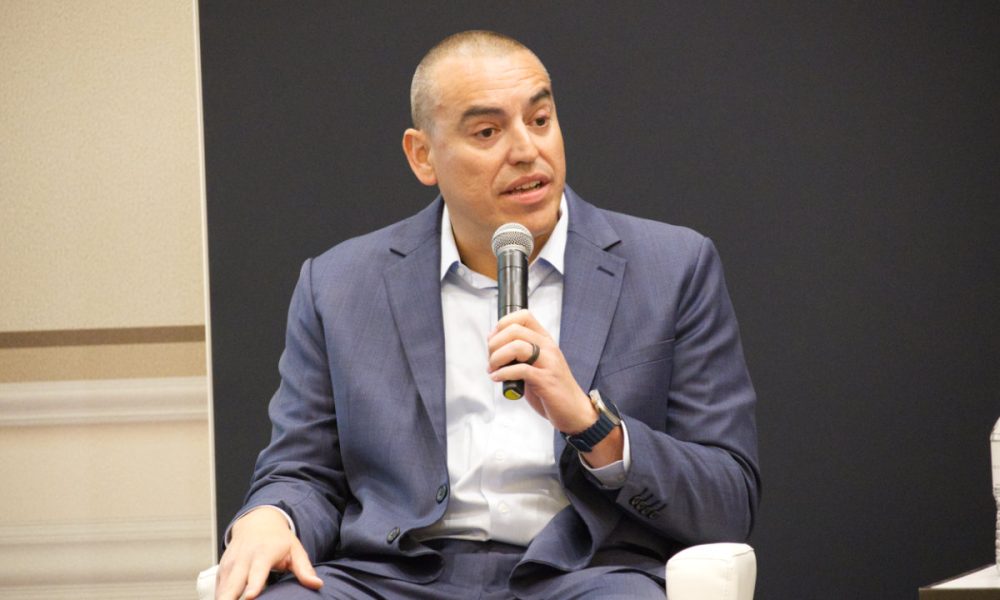
How do you meld multiple companies into one happy business? That was among the overarching questions posed during the “Building Unified Teams” session at Global Gaming Expo on Monday morning shortly after G2E opened.
Fielding Dr. Bo Bernhard’s queries were Aristocrat Gaming CEO Hector Fernandez and Aristocrat Interactive CEO Moti Malul. The latter’s NeoGames company was recently absorbed into Aristocrat as part of a larger consolidation.
Both executives stressed that the strength of parent Aristocrat Leisure and its subdivisions lay in their diversity. Bernhard, a professor of economics at the University of Nevada-Las Vegas, approached the issue through cognitive diversity or what he called “rebel ideas.”
“It’s very easy to dig yourself into a camp” and shut oneself off from new viewpoints, replied Malul. He related that 12 years ago, NeoGames opened a branch in Ukraine, whereupon he heard all manner of calumnies about the local business culture. But Malul found, “If you invest enough effort with enough time, you can clone company cultures with other business cultures.”
Malul explained, by way of example, that his initial forums with Ukrainian employees were always one-way affairs. Within a year, however, a lively dialogue prevailed. “We all tend to think we’re smarter than others. It’s not correct. The teams actively fertilize one another around the world.”
Bernhard asked about clashes of ego, to which Fernandez replied, “It’s fundamentally important to get your teams to believe in the ‘why.’ A lot of businesses fail, because they don’t tell their teams the ‘why,’ particularly when it gets tough.”
Added Malul, “There will be organ rejection for people who join your team and just don’t fit.”
Fernandez quoted former United States attorney general Eric Holder to the effect that diversity grows the pie instead of slicing it into smaller and smaller pieces. “A standalone person is impossible to be good at everything.”
For instance, what was Aristocrat missing? When Fernandez identified those strategic pillars, he set out to find individuals to fill the spots. “You hire the right people and stay out of their way.”
Malul likened collective intelligence to Marvel’s Avengers. “It’s a fascinating example to show that it’s a collaboration of superheroes and together they’re stronger than anything.” For instance, Malul retired the NeoGames brand, not because it wasn’t well known, but because Aristocrat was the right fit for his customers and employees.
As to the actual collaboration of the former NeoGames and Aristocrat, Fernandez said, “It was clear we needed to go online,” following Aristocrat’s successes in terrestrial gambling. “Early on, it was pretty complex to build.” He explained that Aristocrat’s merger-and-acquisition strategy begins with, What is our strategic crisis? To fill that need, it looks internally first.
“It was really [built] around culture and people,” Fernandez continued. “Ninety percent of M&As destroy shareholder value, because people clash.” Not so with NeoGames, he added. To which Malul appended that the two essential elements of a merger are culture and trust.
Malul resumed that the Aristocrat/NeoGames merger was the combination of two complementary teams. “People were very excited about the opportunity,” including the opportunity to work for Aristocrat.
Fernandez added, “The first thing is: no egos. It’s really about finding the best of both worlds.” He related that he was visiting land-based customers in Sofia, Bulgaria, when he met with the NeoGames team for the first time. “It was very clear from that lunch that the culture was a great fit. How do we make each other be successful?”
As for how Aristocrat managed the ensuing growth, Fernandez said that he was very fortunate to have a fast-moving growing business that leans into growth, as “growth actually drives opportunity.” A lack of comfort equals excitement, he explained. “It’s really around, How do we take it to the next level?” The ultimate goal, he said, is to blend discrete divisional roles into one united front.
Malul addressed the question as to how one handles integration without hurting growth. This was, he said, the single biggest challenge. “Make sure that it’s just enough.” He allowed that NeoGames had been possibly over-focused on internal integration. “We really have our ears to the ground on how people feel,” he said, referring to Aristocrat’s 8,000 employees. “Are we putting too much on the teams? On the other hand, we don’t want to delay integration.”
Allowing teams to have their identities was critical, said Fernandez. “We made it very clear across the company that now you can learn all [Aristocrat] businesses.”
Fernandez’s point was “constant adaptability” and to make it, he mentioned his own upbringing, when his seven-year-old self took three buses in order to attend a premier school. (He still has the bus pass.)
“We all have the same basic needs and desires,” he added. In Fernandez’s case, he always thinks of his mother, who left Guatemala at age 23 with three small children, to pursue opportunities in the U.S. “All I have done is exercise my mom’s plan.”











